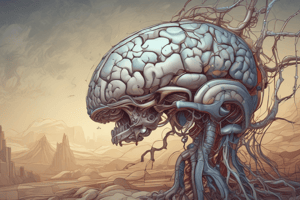Podcast
Questions and Answers
What is the main function of the occipital lobe?
What is the main function of the occipital lobe?
- Responsible for visual processing (correct)
- Associated with parts of speech, reasoning, problem-solving, planning, movement and emotions
- Associated with recognition, orientation, and perception of stimuli
- Associated with memory, speech perception and recognition of auditory stimuli
What is composed of bundles of myelinated axons?
What is composed of bundles of myelinated axons?
- White matter (correct)
- Grey matter
- Cerebral cortex
- Meninges
What is the function of the midbrain?
What is the function of the midbrain?
- Responsible for visual processing
- Acts as a bridge and transmits signals from hindbrain and forebrain (correct)
- Associated with parts of speech, reasoning, problem-solving, planning, movement and emotions
- Associated with recognition, orientation, and perception of stimuli
What is the location of the grey matter in the spinal cord?
What is the location of the grey matter in the spinal cord?
What is the outermost layer of the meninges called?
What is the outermost layer of the meninges called?
What is the primary function of the Central Nervous System (CNS)?
What is the primary function of the Central Nervous System (CNS)?
Which of the following is NOT a division of the nervous system?
Which of the following is NOT a division of the nervous system?
Which part of the brain connects the two cerebral hemispheres?
Which part of the brain connects the two cerebral hemispheres?
What is the outer layer of the cerebral hemisphere termed?
What is the outer layer of the cerebral hemisphere termed?
Which of the following is a function of the Peripheral Nervous System (PNS)?
Which of the following is a function of the Peripheral Nervous System (PNS)?
Flashcards are hidden until you start studying
Study Notes
Functions of the Nervous System
- The nervous system oversees the functions of all bodily organs, receives and integrates information from all senses, initiates and coordinates motor activities, and processes thoughts, generates emotions, and stores memories.
Divisions of the Nervous System
- Anatomically, the nervous system consists of two major components: the Central Nervous System (CNS) and the Peripheral Nervous System (PNS).
- The CNS is composed of the brain and spinal cord, and its major functions are to integrate sensory information and to initiate and coordinate efferent responses.
- The PNS is composed of all the nervous tissue outside the CNS, including cranial nerves, spinal nerves, and ganglia.
Functional Divisions of the Nervous System
- The nervous system can be functionally divided into the somatic nervous system, which controls voluntary functions, and the autonomic nervous system, which controls involuntary activities.
Cerebral Cortex
- The cerebrum consists of two cerebral hemispheres, the right and left hemispheres, connected by the corpus callosum.
- Each hemisphere is mainly connected to the contralateral side of the body.
- The hemispheres are further divided into four lobes: occipital, parietal, temporal, and frontal.
Functions of the Lobes
- Frontal lobe: associated with parts of speech, reasoning, problem-solving, planning, movement, and emotions.
- Parietal lobe: associated with recognition, orientation, and perception of stimuli.
- Occipital lobe: responsible for visual processing.
- Temporal lobe: associated with memory, speech perception, and recognition of auditory stimuli.
Grey and White Matter
- Grey matter is composed of cell bodies of neurons, dendrites, and supporting glial cells.
- The microscopic structure of grey matter varies between different brain regions.
- The majority of cerebral cortex is made up of six distinct layers of neurons.
- In the brain, the grey matter is outside, and the white matter is inside, whereas in the spinal cord, the grey matter is deep inside and covered all around by white matter.
- White matter is composed of bundles of myelinated axons (tracts).
Brainstem
- The midbrain, pons, and medulla oblongata form the brainstem, which contains the vital cardio-respiratory centers.
- The midbrain connects the forebrain and the hindbrain, and acts as a bridge, transmitting signals from the hindbrain and forebrain.
- The midbrain is associated with motor control, vision, hearing, temperature regulation, and alertness.
Meninges
- The meninges consist of three layers, with the outermost layer being the dura mater, also known as the pachymeninx.
Studying That Suits You
Use AI to generate personalized quizzes and flashcards to suit your learning preferences.




